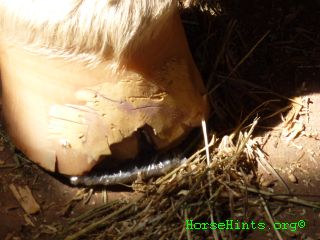| Home Farrier Wisdom | First Posted: Aug 30, 2012 Jan 21, 2020 | |
Picking A Farrier/Horse Shoerby Debora JohnsonFirst of all, what is a farrier? A farrier is a specialist in equine hoof care, including the trimming and balancing of a horse's hoof and the placing of shoes to the horse's foot. A farrier couples a subset of the blacksmith's skills (fabricating, adapting, and adjusting metal shoes) with a subset of veterinary medicine (knowledge of the anatomy and physiology of the lower limb) to address the care of the horse's feet. My farrier of more than 30 years has to retire because of major health issues. Not only is he our farrier, after all these years, he is also a really good friend. The trust and loyalty that we built, over these many years, is going to be next to impossible to replace. My husband and I realize this but had to find a competent farrier. We also realize that in fairness to the farrier we must not compare, but rather look for someone new and take him/her on their own merits. We have a new farrier, who we really like as do our horses. So how did we go about finding this individual remembering the old adage "No feet, no horse." A farrier must meet a number of important requirements like all professionals. Our requirements for a farrier are not just trimming the horse's feet. We want a farrier who must be able to do corrective shoeing and trimming to meet any pathologic problems that a horse may have or develop. It is also important that the farrier understand how a horse moves, his gaits, etc. We happen to have two Kentucky Mountain Horses and they are "gaited." Gaited horses move differently--from the shoulder rather than the knee. They tend to have more extension from back to front and also many have stifle problems. My husband and I do not like any weighted shoes, etc. In fact, our horses are barefoot and do just fine. Many farriers who say they specialize in gaited horses automatically leave the toes long and slap on four shoes around, caulked or weighted. I want a farrier who looks at the horse's conformation, the slope of the shoulders, the coupling, the legs and feet, etc. No two horses are alike. There is no one way to shoe every horse! I want a farrier who is not going to cause future problems or immediate lameness and one who can work to keep a horse pain free and sound, if possible. The following are some considerations when choosing a farrier:
 Visual from top of shattered hoof. You can see that the piece of keg shoe has already be affixed in this picture. However, I wanted you to be able to see the extent of the break before the filler was affixed. When choosing a professional from any discipline many considerations go into that choice. I have listed 6 major considerations above, however, there are those intangibles that arenot listed. Follow your instincts. Simple visuals such as a farrier who rushes through his work, has temper tantrums, uses excessive discipline on your horse, is consistently late and not considerate of your time, etc. |